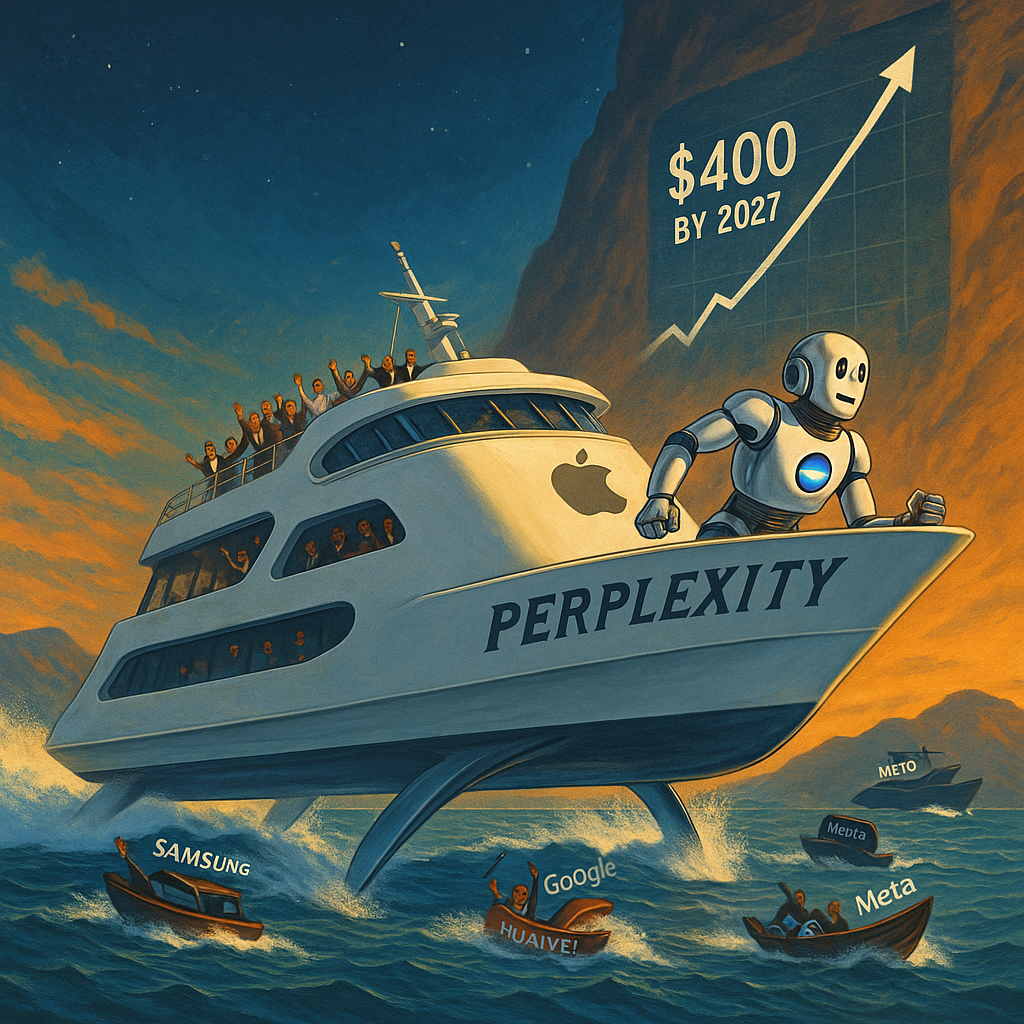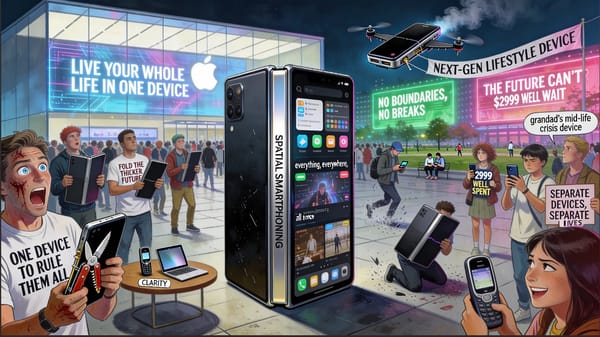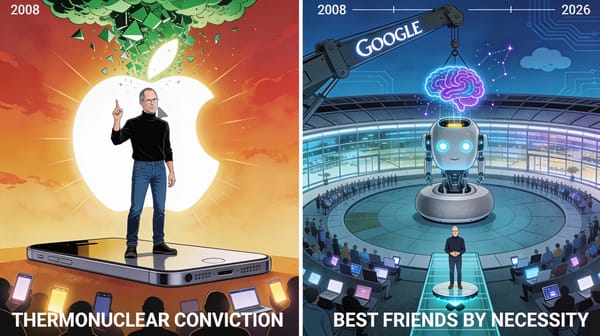The Rise of AI-Native Browsers: Perplexity’s Comet, OpenAI’s GPT Browser (and no Safari).
10th July 2025–Browsers: Judgement Day. Perplexity and OpenAI launch AI-native, agentic browsers. Old paradigms—Safari, Chrome, iOS—start to look obsolete. This isn’t about faster search. It’s about the interface becoming the intelligence. Apple? Stuck in the mud, yelling “WebKit only!” Bozo yeah?
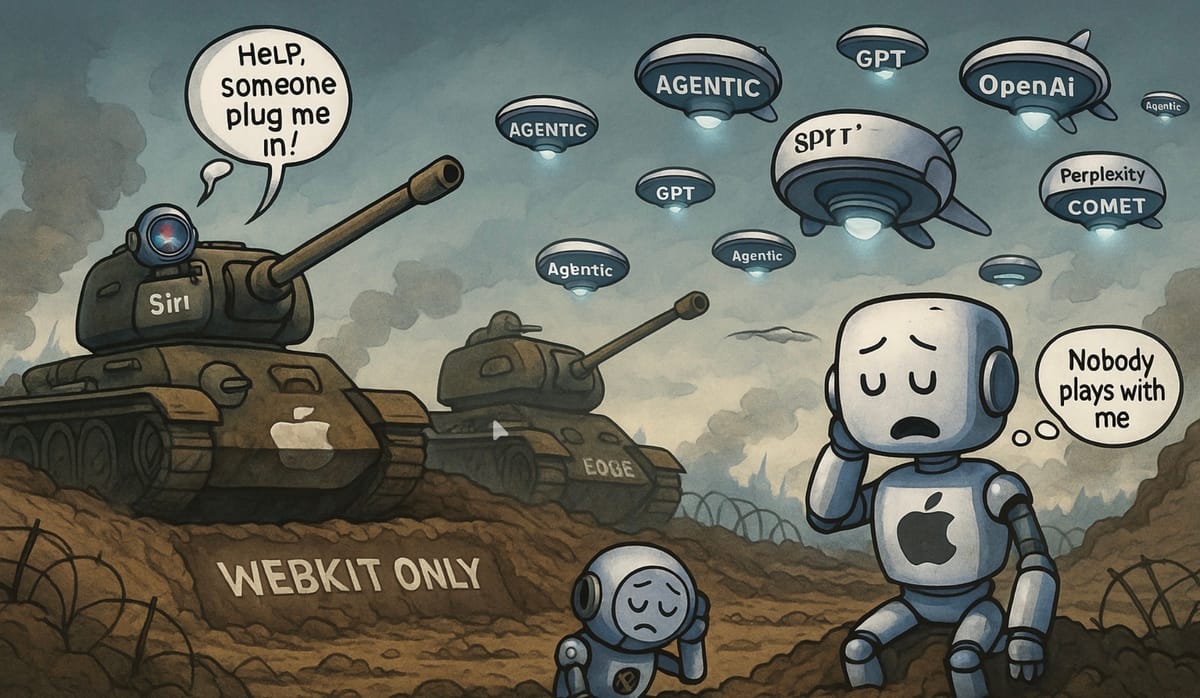
BOOM! The World Just Changed Overnight.
On Wednesday, 9th July 2025, Perplexity announced the launch of its Chromium-based Comet browser, capable of importing all user data from Chrome. It wasn’t just a new product. It was a browser-paradigm shift, albeit in its infancy.
The very next day, Thursday 10th July 2025, OpenAI announced its own Chromium-based browser, designed to integrate natively within its GPT environment.
Both browsers feature agentic capabilities—able to interact with websites, web apps, and SaaS platforms, and even plug into Google’s cloud ecosystem: calendars, email, to-dos, notes—you name it. And they’re voice or keyboard driven.
These aren’t web browsers. They’re contextual, voice-driven “world browsers.” They’re “agentic browsers.” They make traditional browsers feel quaint, as if they belong in a museum. Once you shift off Safari—or any legacy browser—you’ll be as eager to return as you are to reinstall AOL.
But critically: they won’t work with Apple’s iCloud services, which remain dead to AI until Cupertino rewires its plumbing—and even then, will likely be locked out of this growing cross-platform ecosystem and stay within a sanitised walled garden.
Meanwhile, over on CNBC, analysts are bashing each other over whether Tim Cook should be replaced. But that’s not the story. This is. This is what will make or break Apple’s AI strategy—and define how intelligence integrates into our everyday lives.
CNBC anchors, take note. Investors, take heed. This isn’t about ditching Tim Cook. It’s about recognising that the interface has already changed.
This article is your full, illustrated digest of what just happened—and why the browser, the OS, and the web will never be the same again.
— Tommo_UK, London, 7pm UK GMT, 2pm US ET, 10th July 2025
- DM me on X @tommo_uk for more.
- (and someone pass this to Steve Kovach at CNBC—and remind him he’s a tech reporter, not a hype-man working for Tim Cook. Word.)
One Small Request before you read on, for when you finish.
I write for free, not behind a paywall—because it matters. If this 9,000-word, image-rich piece I wrote on-the-hoof in a day so it was on-point in the literal moment of paradigm shifting news – helps you see what’s at stake in the AI/browser war—and how it could drive $AAPL to $400 or send it crashing toward $160—then please: share it.
See those share buttons? X, LinkedIn, Facebook, WhatsApp, Email? Please, use them. I’m grateful for every single reader helping to keep this high-signal blog alive and free. And please, send it to Apple Investor relations too, and any friendly analysts you know. Who knows, maybe some of these tough questions will pop up on the AAPL Q3 Earnings Call on July 31st?
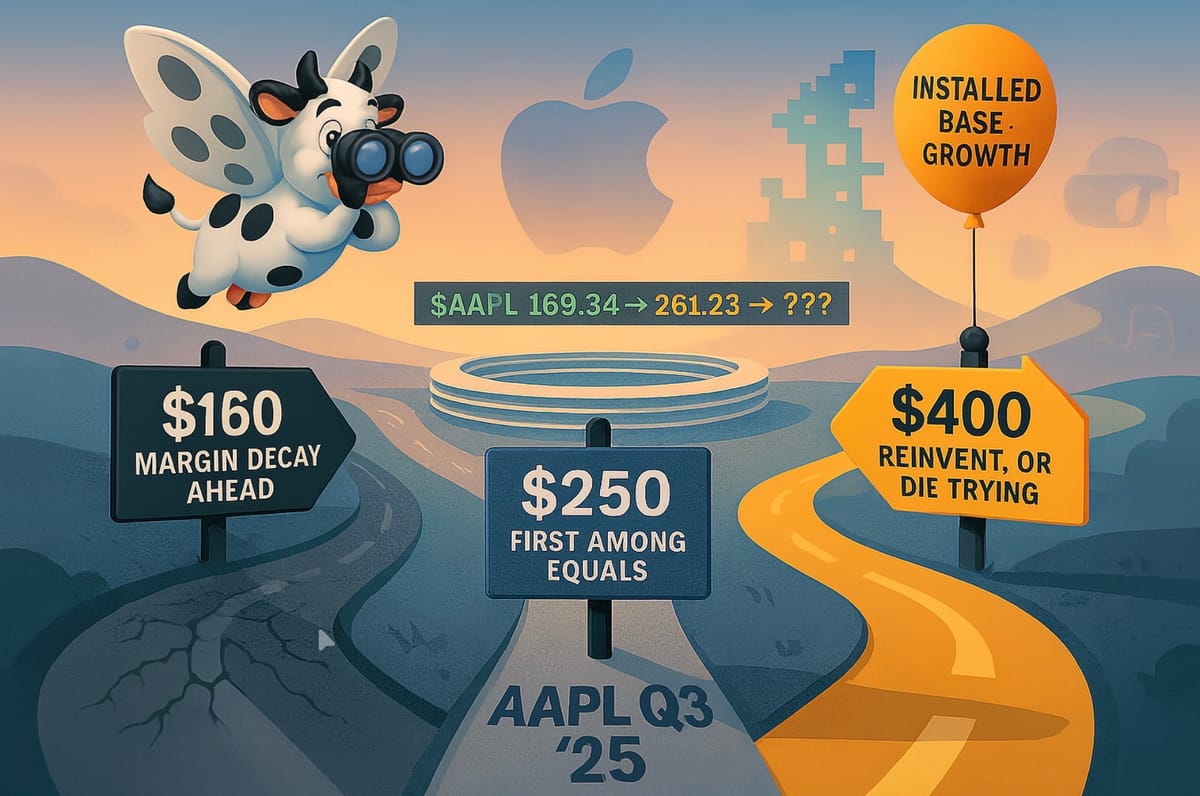
Don’t let the mainstream media sleepwalk you through this. And be sure to check the comments section for a follow-up that takes this even further.
Now, onto the main course.
Context: Why This Matters
The emergence of AI-native browsers like Perplexity’s Comet and OpenAI’s soon-to-launch browser is not just a technical footnote—it’s a seismic shift that threatens to sideline traditional, platform-specific browsers (Safari, Chrome, Edge) and their walled-garden strategies. These new entrants are designed to be platform-agnostic, deeply integrated with user data and context, and fundamentally reimagine the user’s relationship with the web—from navigation to cognition.
Don’t you wish Safari could do this (and that Apple Maps was finally this good)?
If the browser becomes the primary interface, and that browser is powered by a persistent, context-aware LLM agent, the underlying OS and its native browser become little more than a bootloader for the real action. This is the existential threat facing Apple, Google, and Samsung’s traditional UI/UX and search paradigms.

Perplexity’s Comet: Architecture, Features, and Integration
Core Features
- AI-Native Experience: Comet is built from the ground up as an AI-powered browser, not an AI add-on. Perplexity’s search engine is the default, and the Comet Assistant lives in a persistent sidebar, able to “see” and understand any active webpage.
- Task Automation: The assistant can summarise content, answer questions about any webpage, manage tabs, summarise emails and calendar events, and even perform actions like booking meetings or making purchase.
- Contextual Awareness: Because the assistant has access to the page, you’ll be able to ask questions about the , Google Docs, or any article without switching tabs or copy-pasting. It can even compare content you’re reading to previously viewed materials or your own saved projects.
- Hybrid AI Architecture: Comet uses local processing for basic tasks and cloud APIs for complex operations, with privacy controls allowing local-only processing for sensitive data.
- Device Agnosticism: Built on Chromium, Comet supports Chrome extensions and seamless migration of bookmarks/settings, and is available for Windows and macOS, with mobile versions in the pipeline.
- Spaces, Labs, and Memory: For Perplexity Max subscribers (for now, Pro users will be given access soon for $20/month instead of the Mac $200/month), Comet integrates user ‘Perplexity Labs” and user “Spaces,” allowing the browser to tap into users’ saved research, projects, and session memories. This means your browsing, research, and AI interactions are unified and persistent across devices].
- Privacy and Control: Data is stored locally by default, with strict privacy modes and automatically controls what is processed locally vs. in the cloud.
NOTE: Kinda makes Apple’s FMF and PCC sound quaint, but rather late, don’t you think and for any who still thinks “Perplexity is just a search engine,” you’d better start thinking again or you’re just a basic NPC (ask a young Gen-Z friend what that means. Your nephew or his friends will probably help you)
Strategic Implications
- Cognitive Operating System: Perplexity’s CEO describes Comet as a cognitive OS that collapses complex workflows into fluid, conversational interactions, effectively making the browser the user’s main interface for knowledge work and daily tasks.
- Challenging Walled Gardens: By living above the OS and integrating with user accounts, Comet makes the underlying platform (Apple, Google, Samsung) largely irrelevant for most workflows, especially as more apps and services become web-based or API-driven.
- Market Position: Comet is positioned as a direct challenger to Chrome’s dominance, with ambitions to reach a billion queries a week and ongoing partnerships with hardware vendors to pre-install the assistant.

OpenAI’s Browser: What We Know
Core Features (Based on Pre-Launch Reports)
- Deep ChatGPT Integration: The browser is built on Chromium and will be deeply integrated with ChatGPT and OpenAI’s “Operator” agent, allowing users to perform tasks, search, and interact with the web in a persistent chat-like interface.This has deep implications for not just web browsing, but content consumption like streamed music and video. Think Spotify and Netflix, but no visual interface needed - just voice. That jarred you, didn’t it?
- Sandboxed Access to User Data: The browser is expected to allow sandboxed access to user data within the GPT app, meaning your ChatGPT history, preferences, and likely custom GPTs can inform and tailor your browsing and search experience.
- Agentic Capabilities: Operator and future AI agents will be able to perform actions on behalf of users—filling forms, making reservations, summarising content, and automating repetitive tasks, all within the browser environment.
- Platform Agnosticism: By sitting on top of the OS and browser layer, OpenAI’s browser aims to make the underlying device and platform irrelevant, offering a unified, persistent experience across devices.
- Privacy and Data Ownership: OpenAI emphasises user control and privacy, with options to restrict data sharing and clear policies on data ownership and portability.
Strategic Implications
- Disintermediating Traditional Search: By keeping users within a persistent chat interface, OpenAI’s browser removes the need to click through to external websites, effectively bypassing Google’s ad-driven search model and Safari’s relevance too.
- User Lock-In: With hundreds of millions of ChatGPT users already accustomed to the interface, OpenAI’s browser could rapidly gain traction, especially if it offers seamless access to user memories, preferences, and custom GPTs. All your conversation, in one platform, running on top of any platform.
Existential Threat to Platform Browsers: If the browser becomes the primary interface, Safari and other platform-specific browsers risk being relegated to legacy status, especially if they fail to offer comparable AI-native, context-aware experiences. [edit: SEE THE COMMENTS SECTION FOR SOME IN-DEPTH DISCUSSION OF THIS.]
Comparison Table: AI-Native Browsers vs. Traditional Browsers
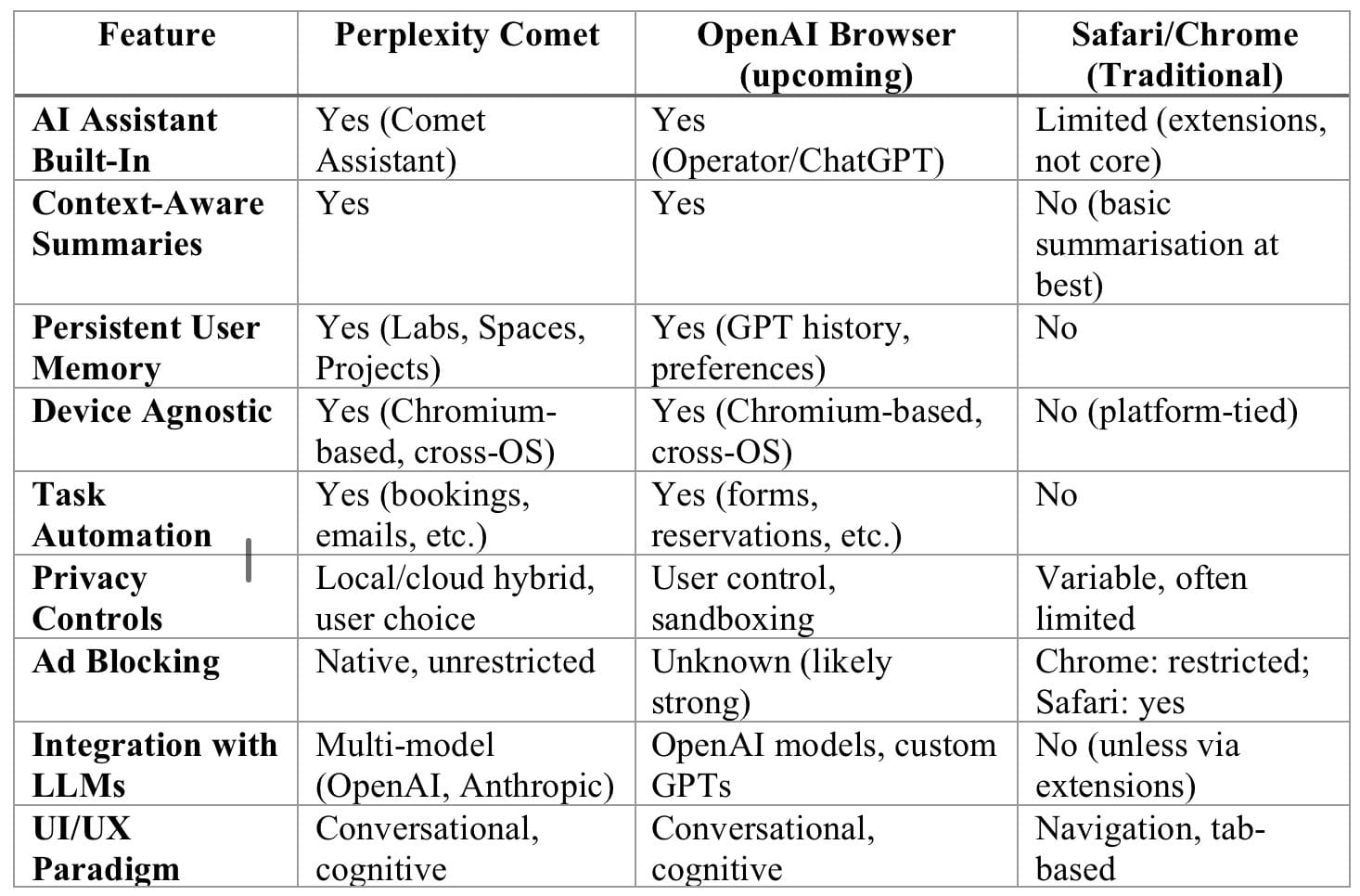
Why This Is an Existential Threat to Walled Gardens
- Platform Irrelevance: If users spend most of their time in a browser that is smarter, remembers context, and automates tasks, the underlying OS (and its native browser) becomes invisible—just a launchpad for the real action.
- Switching Costs Collapse: With user memory, preferences, and workflows stored in the cloud and accessible from any device, the old tricks of platform lock-in (iCloud, Google Account, Samsung ID) lose their power.
Ironically, this is what Steve Jobs dreamed of and described once, about 20 years ago. No platform necessary.
- Traditional Search Marginalised: AI-native browsers keep users “in the flow,” reducing the need for traditional search and the ad-based business models that underpin Google and (to a lesser extent) Apple’s services revenue.
Developer and User Migration: As more users and developers flock to AI-native browsers, the incentive to build for platform-specific APIs and UI conventions diminishes.
Implications for Platform Providers if AI Browsers Become Central
Erosion of Platform Lock-In
- Platform-agnostic AI browsers: (like those from Perplexity and OpenAI) threaten the traditional walled garden approach of Apple, Google, and Samsung.
- If users spend most of their time in a browser that is smarter, remembers context, and automates tasks, the underlying OS and its native browser become little more than a bootloader for the “real” interface.
- Switching costs collapse: With user memory, preferences, and workflows stored in the cloud and accessible from any device, the old tricks of platform lock-in (iCloud, Google Account, Samsung ID) lose their power.
Disintermediation of Native Search and Services
- Traditional search is marginalised: AI-native browsers keep users “in the flow,” reducing the need for traditional search engines and the ad-based business models that underpin Google and (to a lesser extent) Apple’s services revenue.
- Native apps become less relevant: If the browser (powered by an LLM) can automate tasks, integrate with user data, and offer persistent memory, users may prefer to stay within the AI browser with its own calendar, notes, to-do functions and journalling apps – which will likely integrate into Google’s tools directly anyway, but probably not Apple’s iCloud stack, making them work right out of the box as The UI not just an app.

Rather than switch to native apps for basic tasks like email, calendar, or even content creation, users just stay in their GPT or Perplexity UI.
Loss of Data Primacy
- Data ownership and context shift: AI browsers that integrate deeply with user memory, preferences, and context (e.g., ChatGPT history or Perplexity Labs) become the primary custodians of user data, not the platform itself. This undermines the platform’s ability to shape and monetise user experience.
- Privacy and security challenges: As data flows increasingly through third-party AI layers, platform providers lose direct oversight and may struggle to enforce privacy standards or differentiate on security. Working within a single environment, such as GPT or Perplexity, safeguard against this.
UI/UX Paradigm Shift
- Conversational, cognitive interfaces: The rise of persistent, chat-based interfaces makes traditional navigation and tab-based paradigms look dated. If users can accomplish more through conversation and automation, the value of the platform’s own UI/UX conventions is diminished if not a downright annoyance.
- Customisation and agentic capabilities: AI browsers can tailor experiences in real time, automate multi-step workflows, and even act on behalf of users, making static, platform-designed experiences feel clunky by comparison.
- As Chromium is compatible with Chrome extensions, it becomes even more tailorable and with bespoke options open to it, and which will not be compatible with Safari. The carry through of extensions into these AI Browser platforms has not been confirmed yet though.
Safari and WebKit risks being marginalised by a wholesale switch to Chrome/Chromium even on MacOS platforms, top ensure at seamless and shared UX across devices and browsers.
Safari might be in for a kicking. In fact, the entire notion of a proprietary OS stack might be in for a kicking.
Strategic and Commercial Risks
- Revenue cannibalisation: Reduced reliance on native app stores and search means less opportunity for platforms to take a cut of transactions or sell ads.
- Developer migration: As more users and developers flock to AI-native browsers, the incentive to build for platform-specific APIs and UI conventions diminishes, potentially weakening the platform’s ecosystem over time.
Existential Threats and Opportunities
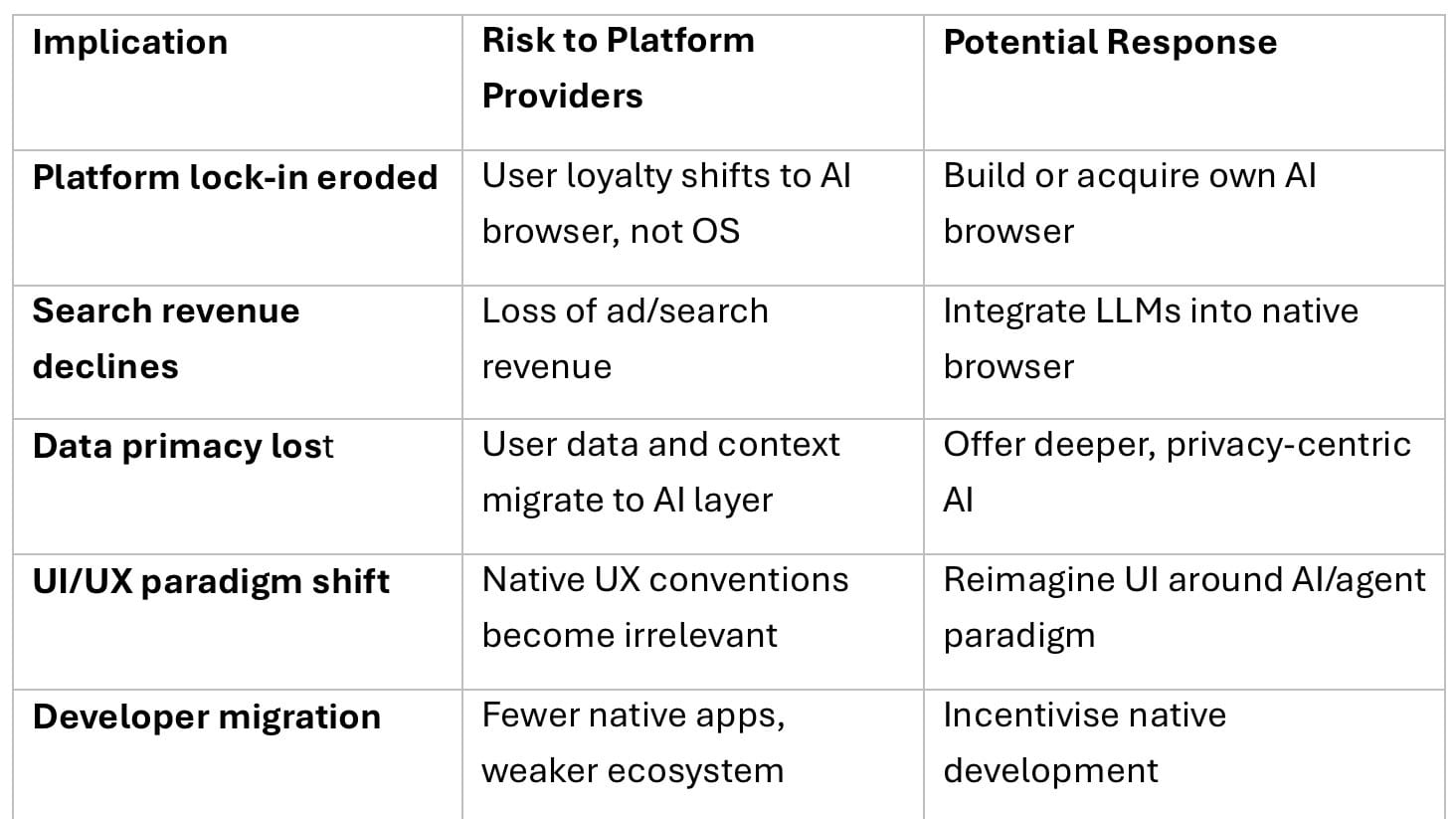
The Apple Example
Apple’s delayed and fragmented AI strategy is already being called out as an existential risk by analysts and users alike, not least me. If AI browsers - “World Browsers,” become the main interface—the new “Interface Reality,”, Apple risks being reduced to a utility platform—providing hardware and basic OS functions while the real value and user loyalty flow to third-party AI layers.
Here’s the risk Apple runs by continuing to do nothing, except ask users and developers to carry on “Waiting for Godot.”
Apple’s AI Paralysis: The Cost of Delay in the Age of AI Browsers, and Apple’s Chronic Late-to-Market Moves
Apple’s recent history reads like a masterclass in missed opportunities and strategic procrastination. Once famed for its “right product, right time” launches (iPhone, iPad, AirPods), Apple now seems locked in a cycle of kicking the can down the road, particularly in AI. The company’s AI efforts—especially around Siri and generative models—have been marked by years of dithering, U-turns, and a reluctance to acquire or partner decisively. This has left them watching from the sidelines as Google, Samsung, Microsoft, and now OpenAI and Perplexity race ahead with agentic, context-aware AI experiences.
- AI as afterthought: Apple dismissed GenAI and LLMs in 2023, only to scramble for relevance in 2024 after competitors launched compelling AI platforms.
- Now in 2025 Apple are talking 2026, while in 2025, Google and Samsung are shipping new Gemini-powered full AI and LLM powered phones.
- WWDC letdowns: Each year brings promises of “next year” for Siri and AI, with the real deal always “just over the horizon, here’s another SDK in the meantime.” Redux 2024. Rolling on 2026.
- Leadership inertia: Executive churn and a culture of insularity have left Apple with a team seemingly more adept at managing supply chains than paradigm shifts.
Today while I write this, 10th July, people are missing the point by calling for Tim Cook’s head.
Tim Cook needs to stay put and stop being a politician and start being a product man, not just an operator. We don’t have time for a smooth operator. The time for action is now. This is war, not a diplomatic era.
The Perplexity Acquisition for Apple: The Door Still Ajar?
The chorus is growing louder: Apple’s best route to relevance in AI might be to try and acquire Perplexity. Analysts and industry watchers have repeatedly pointed out that Perplexity’s AI-native browser, research tools, and hybrid LLM architecture would slot perfectly into Apple’s ecosystem—if only Apple could move past its “not invented here” syndrome.
- First-mover advantage slipping: Every month Apple waits, Perplexity’s value (and integration complexity) rises, while Apple’s negotiating leverage shrinks. Perplexity is shipping, shipping, shipping. Apple seems to have forgotten the meaning off the word.
- Defensive and offensive play: With Google and Microsoft embedding AI deeply into their platforms, and OpenAI/Perplexity building platform-agnostic experiences, Apple risks being boxed out of the next era of computing if it doesn’t act decisively.
- Late to the Party: Perplexity is now on a sharp growth trajectory. Its new interface, misleadingly called a “browser” so as not to confuse people and let the experience do the talking (very Jobsian, that,) is based on Chromium, not Apple’s open-sourced but withering WebKit. This alone makes the deal far less likely than ever, and the widespread interest in Comet is going to encourage Perplexity to carry on going it alone. It was just revalued from $1B to $14B in a few months. Where next? Perplexity’s tight team are, at this point, unlikely to want to throw it all to Apple for any money.
Given if their browser finds a home on for example, smart TVs, making it the ubiquitous interface for your home, it will have outflanked Alexa, Google, and Siri with HomeKit (pffft.. another wasted opportunity from Apple) all at once. Comet, across all your devices from laptop to smart speaker to television to your in-car entertainment (goodbye CarPlay), keyboard or voice driven, with saved context. Yes, it ealyy could be that big. And scale very very quickly.
My article from June... sadly, I think Apple missed the boat.
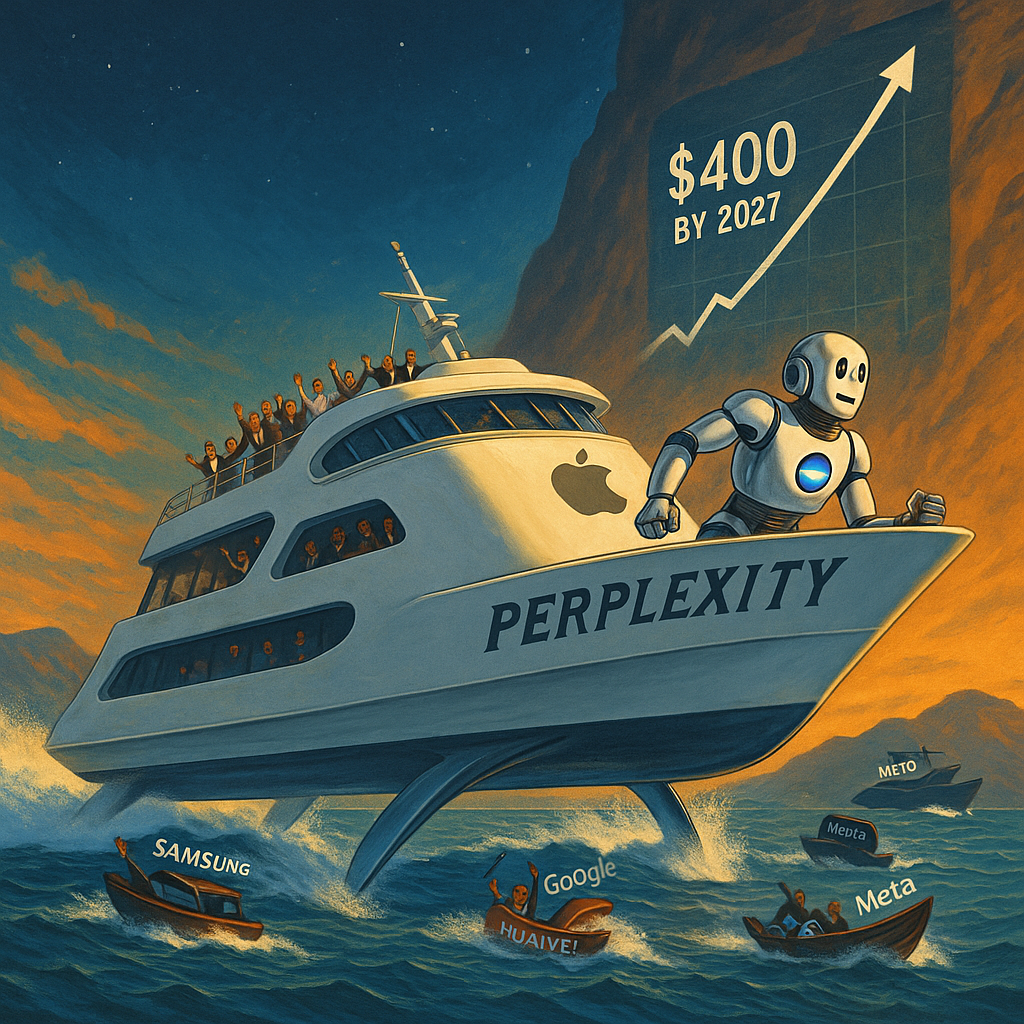
The Browser Wars: WebKit vs. Chromium
The browser battleground is where Apple’s strategic drift could become existential. Both Perplexity’s Comet and OpenAI’s upcoming browser are built on Chromium, not WebKit. This isn’t just a technical footnote—it’s a direct threat to Safari’s relevance and Apple’s influence over web standards.
- Chromium’s gravitational pull: The ability to import Chrome preferences, history, and extensions into these new AI browsers gives them a massive head start. Users can migrate seamlessly, bringing their digital lives with them.
- Safari’s isolation: Safari’s lack of extension compatibility, limited import/export options, and Apple’s sandboxing mean that switching from Safari to an AI-native browser is a one-way street—users can leave, but their data largely stays behind.
WebKit at risk: If the industry standardises around Chromium for AI-native browsers, WebKit risks becoming a niche engine—relevant only on Apple devices, and increasingly out of step with where the web is headed.
The Import Dilemma: Chrome vs. Safari
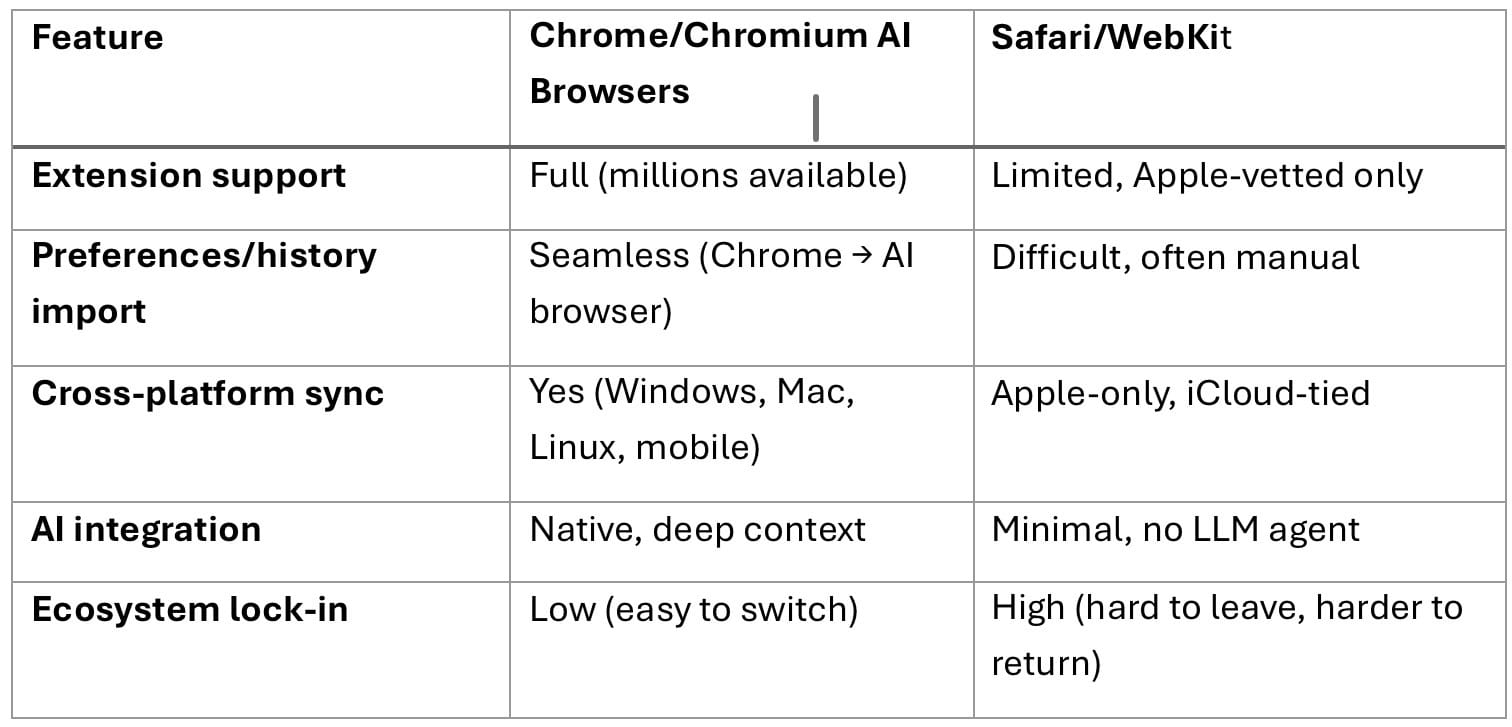
The Existential Threat
If Apple doesn’t act—either by acquiring Perplexity or radically overhauling Safari/WebKit to match the flexibility and intelligence of Chromium-based AI browsers—it risks seeing its browser (and by extension, its platform) relegated to irrelevance. The AI-native browser is rapidly becoming the new “home” for users’ digital lives, and if Chrome users can bring everything with them to Perplexity or OpenAI’s browser, but Safari users cannot, the gravitational pull away from Apple’s ecosystem will only accelerate.
- Safari as legacy: In this scenario, Safari becomes the Internet Explorer of the 2020s—technically competent, but bypassed by innovation and user preference.
- Apple as plumbing: The risk is not just losing browser market share, but losing the entire UI/UX layer to third-party AI agents, reducing Apple to a utility provider for hardware and basic OS functions.
Safari As A Dead End
Apple’s chronic late-to-market moves and refusal to decisively embrace AI—either through acquisition or radical internal reform—have left it dangerously exposed. With the browser becoming the new platform, and the AI layer the new OS, Apple must move swiftly or risk watching Safari, WebKit, and perhaps even iOS itself, be subsumed by a Chromium-powered, AI-native future that leaves little room for walled gardens or slow followers.

How a Platform-Agnostic AI-Browser Challenges Walled Garden Ecosystems Like Apple’s.
A Core Threat of Breaking the Platform Monopoly
A platform-agnostic browser—one that works seamlessly across devices and operating systems, and is powered by AI and persistent user context with access to cloud-based calendars, notes, to-dos, journals and even Google Docs, say, poses a direct challenge to the “walled garden” approach perfected by Apple. Here’s how:
Collapsing Platform Lock-In
- User Data and Memory Travel With You: When your browser knows your preferences, history, and ongoing projects—regardless of whether you’re on a Mac, iPhone, Android, or Windows device—the old tricks of platform lock-in (iCloud, Apple ID, exclusive app ecosystems) lose their teeth. Your digital life is no longer tied to the device or OS, but to the browser and its AI layer.
- Switching Costs Plummet: If all your workflows, bookmarks, sessions, and even “memories” are browser-based and cloud-synced, moving from an iPhone to an Android or Windows device becomes almost frictionless. The device and OS become commodities, not differentiators.
Disintermediation of Native Apps and Services
- The Browser Becomes the OS: With deep AI integration, the browser can summarise, automate, and interact with web content, emails, calendars, and even third-party services. Why bother with native apps if the browser can do it all—contextually and conversationally?
- Native App Stores Lose Relevance: If users spend most of their time in an AI-powered browser, the economic moat of the App Store (or Google Play) shrinks. Developers may prefer to build “apps” as AI agents or browser extensions, bypassing Apple’s 30% cut and approval process.
UI/UX Paradigm Shift
- Conversational Interfaces Trump Static UI: An AI-native browser offers a persistent, context-aware assistant that can automate tasks, answer questions, and proactively help, making traditional navigation and app-based interfaces feel archaic.
- Personalisation at Scale: The browser can tailor content, automate multi-step workflows, and “remember” your context across sessions and devices in a way that no single-platform UI/UX can match.
Loss of Data Primacy and Monetisation
- Data Ownership Moves Up the Stack: When the browser (and its AI) is the custodian of user data and context, Apple’s ability to shape, monetise, and secure the user experience is eroded. The browser—not the OS—becomes the primary interface for search, content creation, and daily tasks.
- Ad and Search Revenue at Risk: If AI-native browsers keep users “in the flow” and reduce the need to click through ads or use traditional search engines, the ad-based revenue models of Apple and Google are threatened.
Developer and User Migration
- Developers Follow the Users: As users flock to AI-native browsers for their productivity and convenience, developers will follow—building for the browser’s agentic model rather than for platform-specific APIs.
- Ecosystem Weakening: The incentive to build for Apple’s (or Google’s) ecosystem diminishes if the browser is where the action is.
Table: Platform-Agnostic Browser vs. Walled Garden
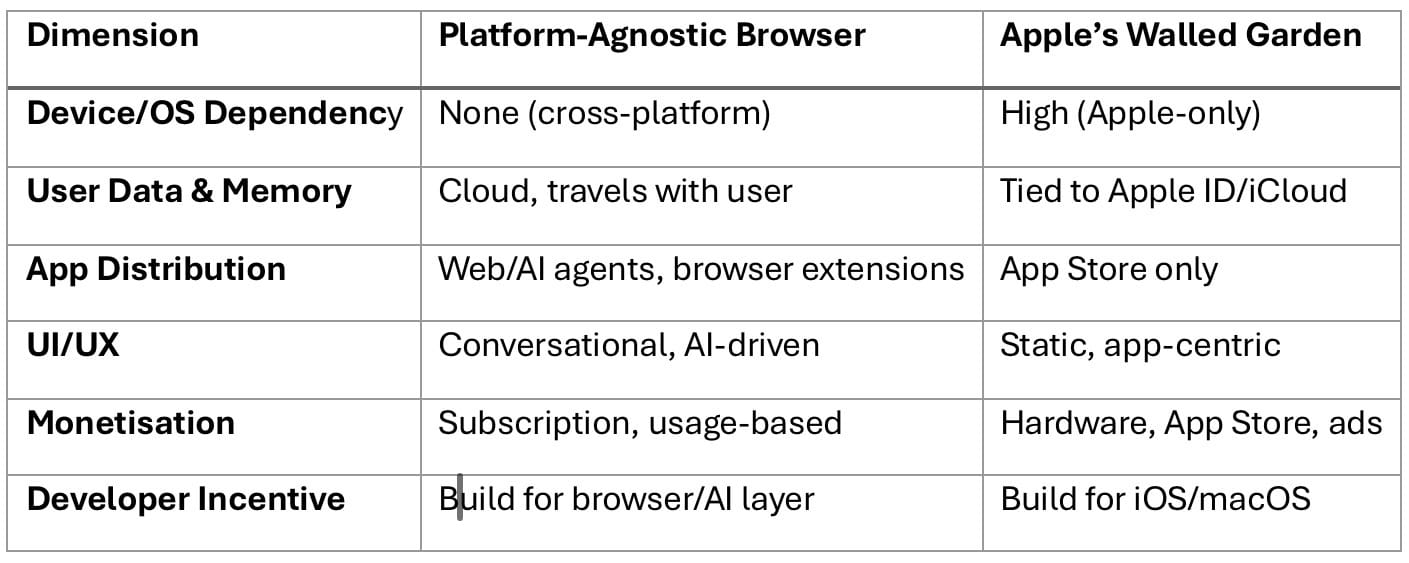
How AI-Native, Platform-Agnostic Browsers Threaten Walled Garden Revenue Models
Disruption of Search and Advertising Revenue
- AI browsers keep users “in the flow”: With integrated, context-aware search and summarisation, users are less likely to leave the browser for traditional search engines.

This undermines the ad-driven revenue models of companies like Google and, to a lesser extent, Apple, who benefit from default search agreements (e.g., Google paying Apple billions to be Safari’s default search engine).
- Reduced click-throughs and ad impressions: If the AI assistant provides direct answers, summaries, and even completes tasks, users bypass the ad-laden web pages that drive revenue for both the platform and its search partners.
Erosion of App Store and In-App Purchase Revenue
- Browser as the new app platform: If users can access advanced AI-powered “agents,” extensions, or mini-apps directly within the browser, the need to download native apps from the App Store or Google Play diminishes. This threatens the lucrative 15–30% cut Apple and Google take from app sales and in-app purchases.
- Subscription and microtransaction leakage: AI browsers could facilitate direct subscriptions or transactions, bypassing the platform’s payment rails and their associated fees.
Redux Epic’s App Store fight, but without Apple having any say in the matter, because the App Store becomes irrelevant. Whoops!
Undermining of Platform Services
- Cloud and ecosystem lock-in weakens: When user data, preferences, and workflows are stored in the browser/cloud rather than being tied to iCloud, Google Drive, or Samsung Cloud, the stickiness of these services—and their associated subscription fees—declines.
- Cross-platform continuity: With a browser that syncs context and memory across devices, users have less incentive to pay for platform-specific continuity features (like Apple’s Handoff, Universal Clipboard, or Family Sharing).
Decline in Hardware Differentiation and Upsell
- Device commoditisation: If the AI browser provides a uniform, high-quality experience everywhere, the value of paying a premium for Apple hardware (or Google/Samsung flagships) is diminished.
- This could impact hardware margins, as users may opt for cheaper devices knowing their core experience is browser-based and device-agnostic. It might completely upend the upgrade cycle hardware companies depend on every year.
- Bundled services at risk: Apple One, Google One, and similar bundles rely on exclusive integration.
If the browser can access and manage similar services independently, the rationale for paying for bundled platform services weakens.
Weakening of Default Partnerships
- Search engine deals devalued: Google’s multi-billion dollar (currently $20B/year) payment to Apple for default search status in Safari is justified by user traffic and ad revenue.
- If AI-native browsers become the primary interface, the value of these deals collapses, directly hitting both parties’ bottom lines.
Google might pull its deal from Apple, rather than Apple withdraw from it, given the annual cost, if it feels it can do better by selling its own smart-search powered by Gemini, for example.
- Content and media partnerships: Platforms often negotiate exclusive deals for news, music, or video. If AI browsers can aggregate and summarise content across sources, the value of exclusivity is eroded.
Impact on Developer Ecosystem and Revenue Share
- Developers migrate to browser/AI agent model: As developers shift to building for AI browsers and agents, platform providers lose their cut of app sales, subscriptions, and in-app purchases.
This could hollow out the economic moat of the App Store and similar platforms.
- Loss of data-driven monetisation: With user data and context migrating to the browser/AI layer, platforms lose the ability to monetise user behaviour through analytics, targeted ads, and personalised services.
Revenue Streams at Risk from AI-Native, Platform-Agnostic Browsers
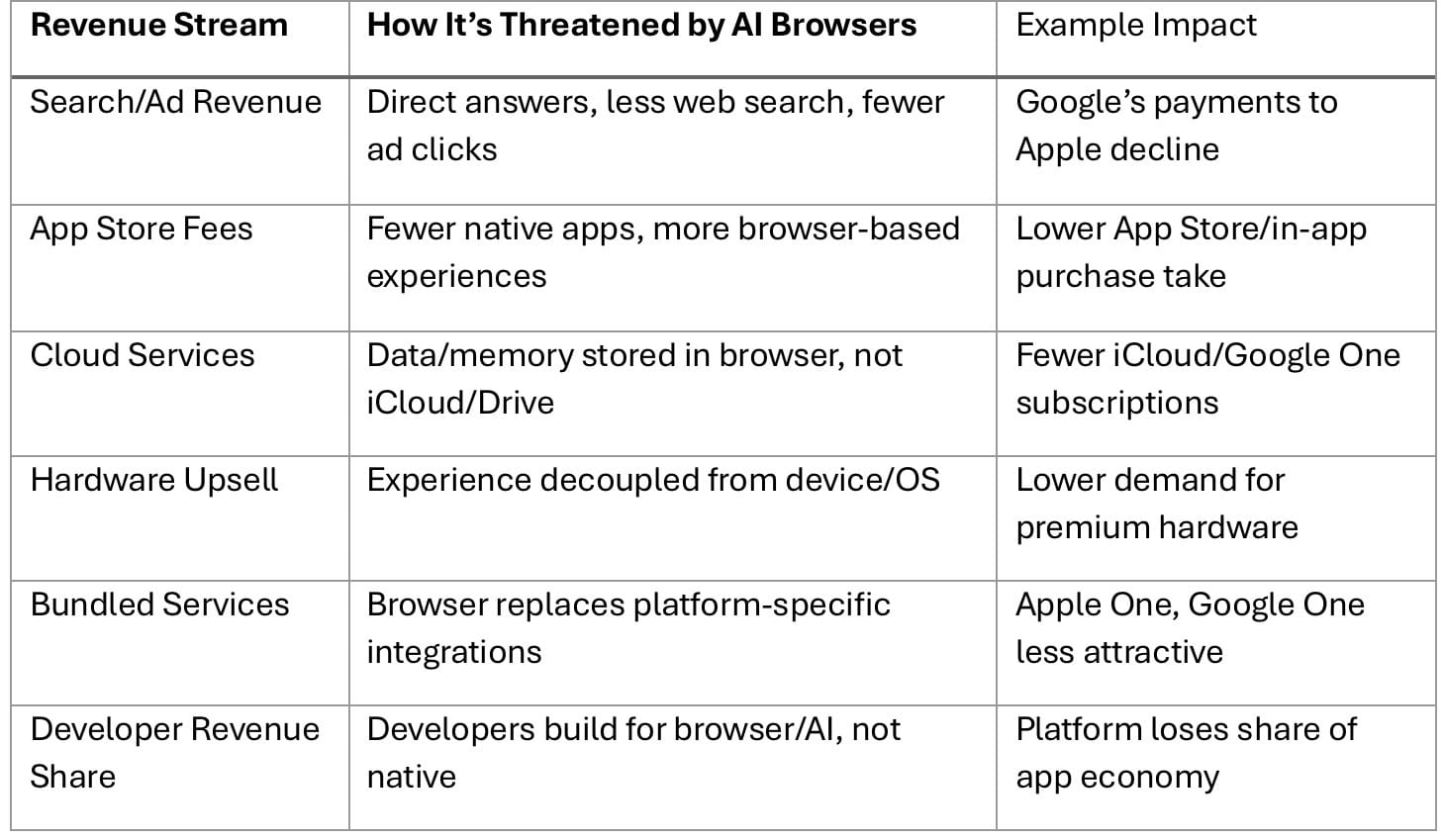
The Existential Challenge
If users spend most of their time in an AI-powered, platform-agnostic browser, the OS and its native browser become little more than a bootloader for the “real” interface. Apple’s carefully cultivated ecosystem risks being reduced to a utility layer, with all meaningful user interaction, memory, and value creation migrating to the AI/browser layer.
The endgame? The platform becomes invisible. The browser—and its AI—becomes the new home for your digital life, and the old walled gardens start to look like quaint, overgrown relics, like the eWorlds, and AOL, of their day became.
If AI-native, platform-agnostic browsers become the primary interface for users, they will siphon off the most lucrative revenue streams from walled garden ecosystems, forcing Apple, Google, and others to rethink their business models or risk being reduced to commodity hardware and invisible software plumbing.

Should AI browsers (or to put it more accurately these “Cognitively Aware Operating Systems”) become the primary interface for knowledge work, search, and daily tasks, platform providers face the prospect of becoming invisible utilities—relevant only for hardware and basic connectivity, while all meaningful user interaction, memory, and value creation migrates to the AI layer. The existential threat is real: adapt or become the plumbing for someone else’s platform.
A Q&A: AI-Native Browsers, Platform Moats, and Strategic Risks
Below is a structured Q&A addressing the most salient questions raised by this rapid digest article, with points of interest and key observations. A later series on the content of this article is planned, once the new platforms have been thoroughly examined. In the meantime, for your speculation and discussion (please, do consider sharing your thoughts in the comments section):
How Might OpenAI’s Browser Store or Sync Memory?
Points of Interest:
- OpenAI’s browser is expected to have sandboxed access to GPT context and user data, but it’s unclear if it will support persistent, cross-device memory akin to Perplexity’s “Spaces”.
- Given the in-built capabilities of this within the GPT platform is already urgent, it would be counterintuitive not to include these features. OpenAI’s platform is by far the most advanced of all LLMs in this regard.
The ability for users to say “remember this tab”or even “remember this form” or “take the third paragraph out and save it to Notes,” and then recall it on another device would effectively collapse Apple’s iCloud continuity moat.
Key Answers & Observations:
- If OpenAI enables cross-device memory recall (e.g., persistent tab/session memory, project recall), it would allow users’ digital lives to travel with them, regardless of device or OS.
This would directly undermine the stickiness of Apple’s iCloud and similar platform continuity features.
- The technical challenge is not trivial: secure, privacy-compliant syncing of context and session data across devices requires robust cloud infrastructure, but OpenAI’s existing GPT account system is a natural foundation for this.
- Should OpenAI deliver this, the “platform as bootloader” scenario becomes reality: the browser (and its AI layer) is the true home, and the underlying OS is reduced to commodity status.
Will Apple Ever Allow Comet or the OpenAI Browser on iOS Properly?
Points of Interest:
- Apple’s WebKit mandate on iOS currently blocks full functionality of third-party browsers, including AI-native ones like Comet and OpenAI’s browser.
- Regulatory pressure from the EU’s Digital Markets Act (DMA) could force Apple to allow true, uncrippled browsers on iOS.
- This could be a replay of the browser wars of the early 2000’s where Microsoft fought tooth and nail to maintain almost-proprietary access to the web by forcing use of Internet Explorer thanks to it deliberately breaking web standards, and forcing work-arounds which often made other browsers fail to load sites, or interactive features.
- This regulatory risk to Apple (once more) is high, if it decides a to behave like Microsoft did. The cases against Microsoft, and the triumph of Apple over them, should be a salutary lesson for the company to not let itself get sucked into yet another disastrous battle with regulators and the judiciary, of hundreds of millions of Perplexity and ChatGPT users complain Apple is blocking use of their AI platform.
The backlash would be ethereal in its vastness in my opinion.
Key Answers & Observations:
- As it stands, iPhone users are likely to get a neutered experience: Comet and OpenAI’s browsers may be available, but without full access to their AI-powered features, especially persistent memory, deep context, and extension support.
- If regulatory pressure succeeds, Apple’s last line of defence—the walled garden—could be breached, enabling users to run fully functional AI-native browsers on iOS.
- The risk for Apple is existential: if users can run the same AI browser everywhere, the iOS moat is drained, and the value of Apple’s “seamless” ecosystem is sharply diminished.
Will OpenAI’s Browser Outflank Perplexity by Pulling in Custom GPTs?
Points of Interest:
OpenAI’s browser is expected to leverage persistent GPT context and user preferences, but the killer differentiator could be “CustomGPT-aware browsing.”
- Imagine a scenario where your legal GPT annotates web content live, or your research GPT proactively surfaces relevant data as you browse, and your travel GPT notes sites you visited while planning your trip and automatically stored them, and text or images you select.
Key Answers & Observations:
- If OpenAI enables background, session-persistent CustomGPTs to interact with web content (send cloud services like google mail, cloud, docs, calendar etc) in real time, it would create a new class of “agentic browsing.”
- This is a step beyond Perplexity’s current model, which is more focused on summarisation and research automation and would catapult it well passed anything Apple is able to offer, immediately, making it a workable alternative to Apple’s walled garden forever-after.
Faced with having to lose data in the cloud and integration built up over just a few months, or a year, Apple might face significant challenges winning back users to their own services, if they always have much of their data and daily activities shifted outside of it.
- Such a feature would be a massive draw for professionals and power users—turning the browser into a dynamic, context-aware workspace tailored to the user’s domain, with live interaction with scheduling, cohabitation, personal workspaces and all the core services of, say iOS, available in the cloud through its AI and LLM driven interface and browser.
- The risk for Perplexity is that OpenAI’s ecosystem of CustomGPTs (and developer momentum) could rapidly outpace its own Labs/Spaces model, especially if OpenAI nails the UX for agentic, multi-GPT browsing.
Will Platform Providers like Apple “AI-ify” Native Browsers—Or Build Parallel AI Shells?
Or just sit back and say, like they did about genAI and LLMs that it’s just a passing fad, and just fiddling with machine learning (ML) in an attempt to artificially make already fantastic photographs even faker for their Instagram-obsessed customers?
Points of Interest:
- Safari (and Chrome/Edge) are at a crossroads: do they bolt on AI features, or build entirely new “cognitive layers” that sit above the browser? Chrome – thanks to Chromium and the basis for both LLM browsers – already has an advantage, and users of the two AI platforms will be able to import their data, history, tabs and extensions directly into Meteor (Perplexity) and OpenAI’s GPT Browser. At the moment, the same is not true of Safari.
- Apple’s historic reluctance to cede control to third-party engines or agents is well known.
Key Answers & Observations:
- The most likely scenario is a two-track approach: incremental AI features (summarisation, SiriKit extensions) in Safari, and a parallel effort to build a “Cognitive Layer” or agentic shell that can eventually replace or envelop the traditional browser.
- Apple’s challenge is cultural as much as technical: its DNA is about control and privacy, but the AI paradigm demands openness, integration, and persistent user context—qualities not easily squared with Apple’s current approach.
- If Apple fails to respond decisively, it risks Safari becoming the Internet Explorer of the 2020s: technically competent, but bypassed by innovation and user preference.
Financial Impact Calculations: Developer Exodus and App Store Risk
Points of Interest:
- The articles highlight the risk to App Store commissions, search revenue, and platform leverage if AI-native browsers become the primary interface.
- The next step is to model a “Developer Exodus” over 3 years and quantify the impact of micro-apps delivered via browser sessions.
Key Answers & Observations:
- If developers and users migrate to AI-native browsers, the incentive to build for platform-specific APIs and app stores collapses. Instead, “micro-apps” (CustomGPTs, browser extensions, AI agents) become the new app economy, bypassing Apple’s 15–30% cut.
Over a 3-year horizon, a plausible scenario is:
- Year 1: Early adopters and power users shift workflows to AI browsers; developer interest in native apps wanes.
- Year 2: Major SaaS and productivity vendors launch AI browser agents, reducing reliance on App Store distribution.
- Year 3: The majority of new consumer and enterprise “apps” are browser/AI-native, with platform-specific apps reserved for hardware-tied use cases (e.g., camera, sensors).
- The net effect: Apple’s App Store and services revenue face a slow bleed, as the gravitational pull of the AI browser/agent model grows. The “developer exodus” is not a cliff but a steady migration, with each year’s cohort less tied to the old moats and more invested in the AI layer.
AI-Native Browser Threats to Platform Moats
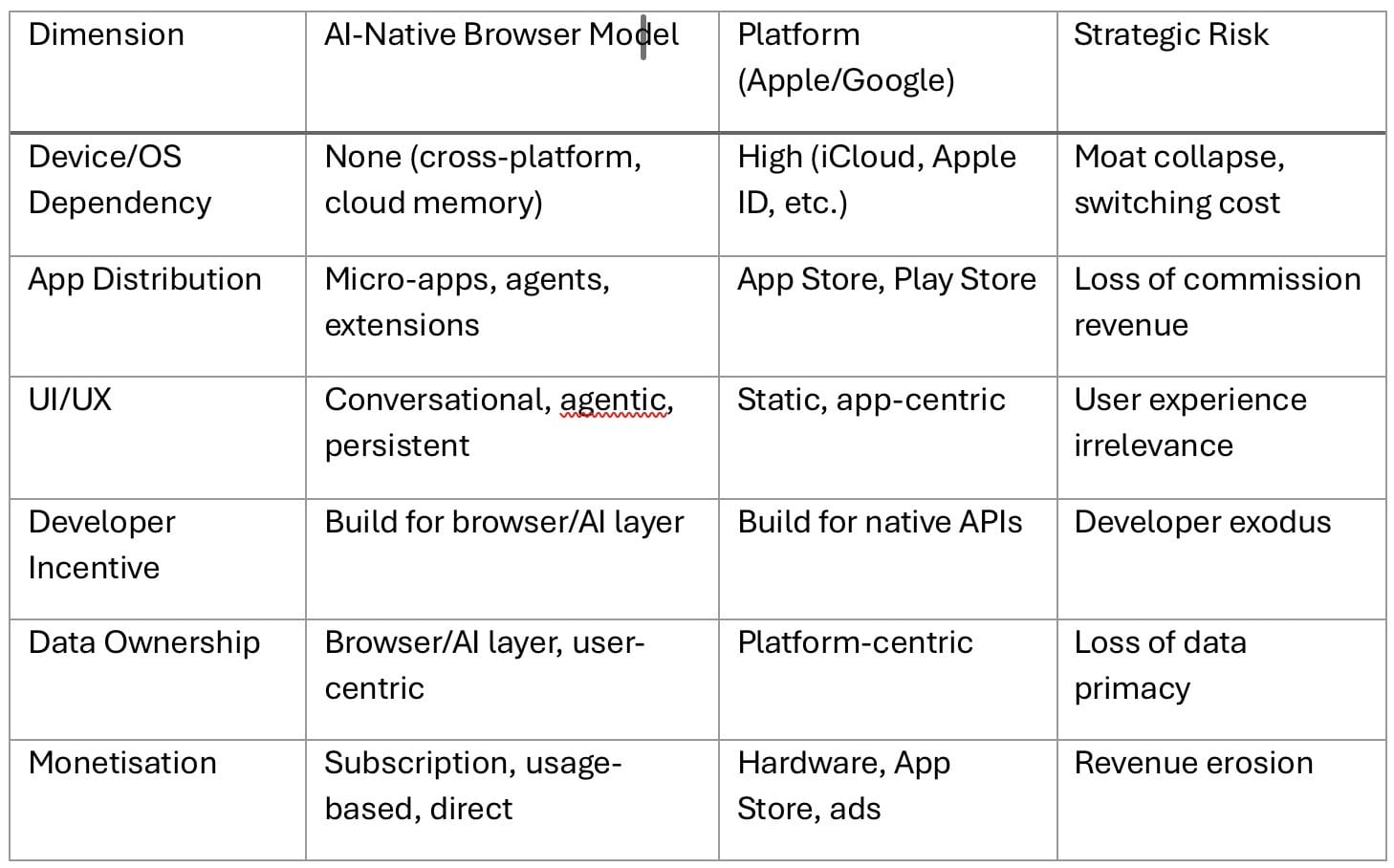
Final Observations
The existential threat is not hypothetical: If OpenAI and Perplexity deliver persistent, cross-device memory and agentic browsing, the platform moat is breached—Apple and Google risk being reduced to plumbing for someone else’s interface. Except, Google has Gemini, of course. Apple has… nothing at all, for now.
Regulatory pressure is a wild card: The DMA and similar efforts could force Apple’s hand, opening iOS to true AI-native browsers and accelerating the erosion of its walled garden. Just like happened to Microsoft.
Apple needs to learn its history lesson, and visit importantly, investors must accept the risk is real, not nix it.
The developer migration will be subtle but inexorable: As the AI layer becomes the locus of value and user experience, the economic and strategic rationale for platform lock-in steadily erodes.
Apple’s best hope: Either radically overhaul Safari/WebKit to match the intelligence and flexibility of Chromium-based AI browsers, or bite the bullet and acquire (or out-innovate) a player like Perplexity—before the gravitational pull becomes irresistible.
The time to do that seems to be rapidly running out though, and the demand from the enormous paid user base of OpenAI to use its browser in conjunction with its LLM and AI functions and agent in capabilities could drive a schism between Apple device owners/GPT users and not wishing to lose their conversations and data in their GPT environment to Apple.
Meanwhile you might want to read some of my earlier tales on Apple, AI, and Perplexity:
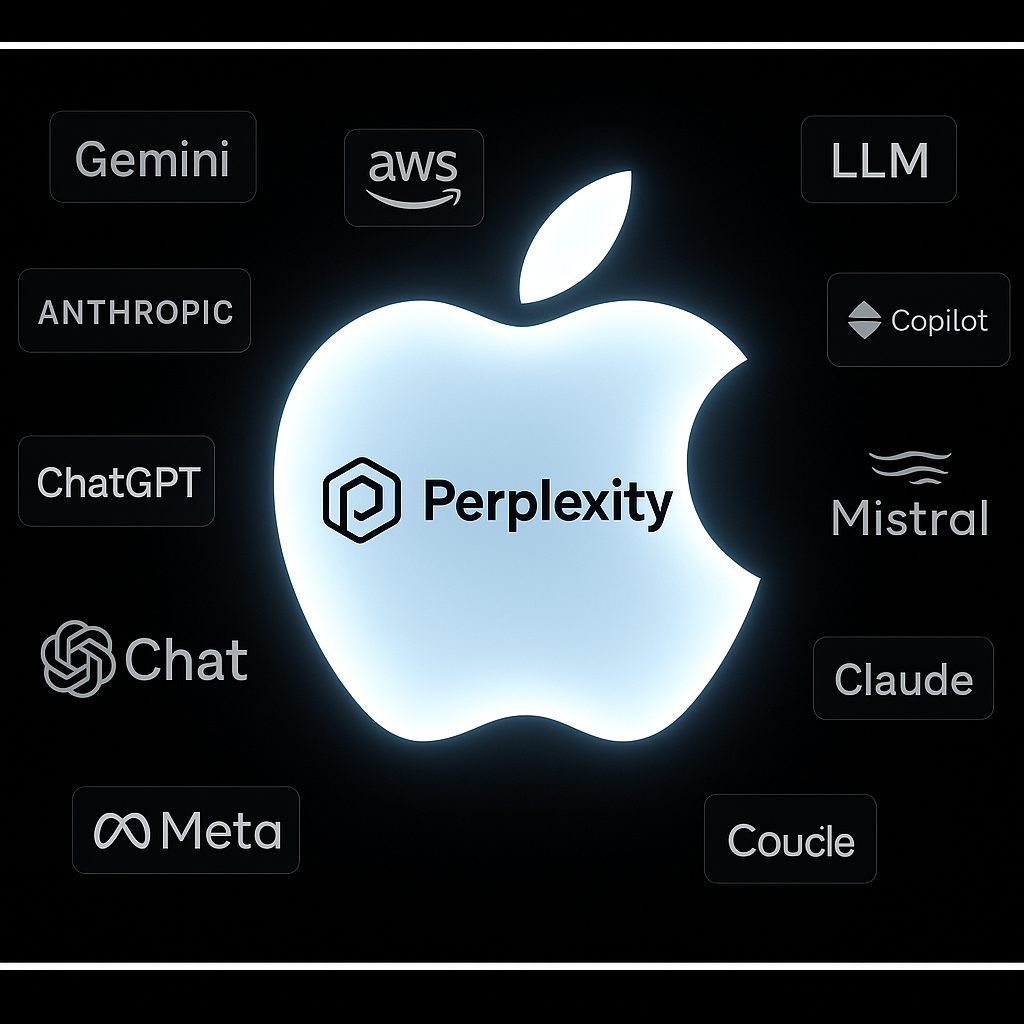
Some Questions You Likely Have:
But… Apple already allows 3rd Party Browsers on its platforms surely?
Yes… and .. well, no. And here’s where you can see yet another regulatory battle forming, can’t you? In fact, it’s already been fought, and won, by the EU.
Third-Party Browsers on iOS: What’s Actually Allowed? Are There Other Browsers on iOS?
Yes, you’ll find Chrome, Firefox, Edge, Brave, and others in the App Store. However, every single one of them is required to use Apple’s WebKit browser engine under the hood so, in effect, they are all “Safari in a different hat” rather than true independent browsers.
Note: This has been enforced globally since the App Store’s inception, with only a partial exception for the EU from 2024 onwards (and even then, only on devices physically located in the EU).
Key Limitations for Third-Party Browsers on iOS:
- WebKit Mandate: All browsers must use Apple’s WebKit engine, not their own (e.g., Chrome can’t use Blink, Firefox can’t use Gecko).
- Feature Parity: Browsers can’t innovate beyond what WebKit allows; features available on Android or desktop (like advanced privacy controls, extension support, or unique rendering features) are often missing or limited on iOS. Security under iOS/WebKit has arguably led to stagnation on Apple’s mobile platforms.
- Security & Privacy: Apple argues this centralisation improves security, but it also means all browsers are subject to the same vulnerabilities and update cadence as Safari.
- In-App Browsers: Even in-app browsers (like those embedded in apps such as Facebook or Perplexity) must use Apple’s WKWebView, which is WebKit-based.
“But What About MacOS?”
On MacOS, there are no such restrictions. Chrome, Firefox, Edge, and others run their own engines natively, with full access to their own feature sets.
In-App Browsers and Data Access: Can Apple Block Perplexity or GPT Browser Features?
Access to User Data
- App Data: Any app (Perplexity, OpenAI’s GPT, etc.) can access its own user data, chat history, and preferences. Apple does not restrict this. This is why you can use your Perplexity or GPT account and see your own threads, history, and so on.
- Web Access: When these apps offer “in-app browsing” (e.g., Perplexity’s Voice Assistant browsing the web for you), they are required to use WKWebView (WebKit) for any web content rendered inside the app.
“Can Perplexity or OpenAI Run Their Own Browser Engine on iOS?”
No. Yes, well, only in the EU: Outside the EU, Apple’s rules still require all in-app browsers and standalone browsers to use WebKit. Even if Perplexity or OpenAI want to embed their own browser engine (e.g., Chromium/Blink), they are technically and contractually blocked from doing so. Who said Vestager was all-bad?
- Inside the EU: As of 2024, Apple allows non-WebKit browsers in the EU, but this is physically enforced by device location, and Apple still sets strict security and privacy requirements.
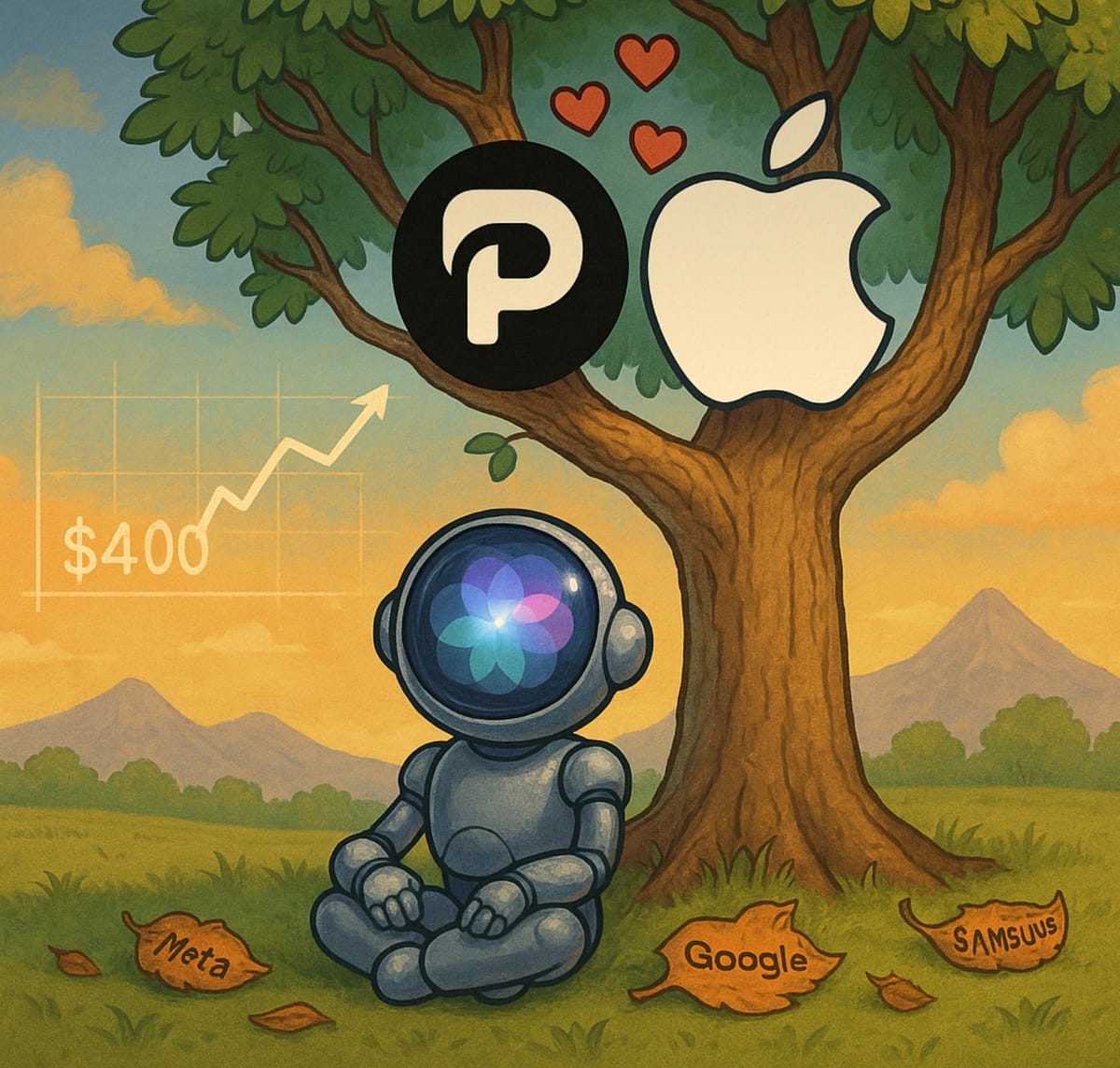
“What About “Browser Experiences” Inside Apps?”
- Web Content: Any web page shown inside an app (even if it’s called “Comet Browser” or “GPT Browser”) must be displayed using WKWebView, so it’s still WebKit under the hood.
- App Data: Apps can freely access and display their own user data, but cannot bypass the WebKit rule to render third-party web content. At least not outside of the EU. Inside the EU there are Alt-Stores.
How Apple Enforces These Rules
- App Store Review Guidelines: These explicitly requires all browsers and in-app browsers to use WebKit.
- Technical Enforcement: Apple’s APIs (WKWebView, SFSafariViewController) are the only sanctioned way to display web content in iOS apps. Attempting to embed another engine is grounds for App Store rejection.
- Device Location: For EU-only exceptions, Apple checks device region and only permits non-WebKit engines on devices physically located in the EU.
Summary Table: iOS Browser Engine Policy

Musings
It’s no mistake that apps like Perplexity and GPT can access their own user data and history on iOS.
What they cannot do is render third-party web content using anything other than WebKit, unless you’re in the EU and using a device configured for that region.
The WebKit rule is the main technical and policy lever Apple uses to control browser innovation and competition on iOS.
This is why Chrome, Edge, Firefox, and any “browser experience” in an app are all, in practice, Safari in disguise—at least outside the EU. This precisely mirrors the integration of Internet Explorer and Windows, and we know how that ended up. Apple is mirroring the behaviour of its biggest old enemy and using the same aggressive lock-in tactics Microsoft used, arguably.
On macOS, there are no such restrictions.
Any browser can use its own engine, just as you’d expect. So why, users and then regulators will argue, can’t they on their other iOS devices?
The Road Ahead
This as a paradigm shift, not just a product launch. The combination of device-agnostic, AI-native browsers with persistent user memory and agentic capabilities is poised to upend the entire stack of consumer computing. If Apple, Google, and Samsung don’t respond with comparable cognitive interfaces, their platforms risk being reduced to mere commodity hardware and legacy software layers.
This is not just about watching a browser war; we are witnessing the first shots in the battle for the future of the personal computing interface, and hint: nobody is going to care about “Liquid Glass.”
The Vicious Cycle
Platform lock-in creates a self-reinforcing loop: the more users a platform traps, the more power it has to dictate terms to both users and developers. This leads to less innovation, higher prices, and fewer genuine choices. Over time, the market calcifies—until, that is, a disruptive force (like an AI-native, platform-agnostic browser) arrives in the cycle.
Final Thought
Platform lock-in is the enemy of both innovation and consumer sovereignty. It breeds complacency among incumbents, stifles the upstarts, and leaves users paying more for less. The antidote? Open standards, interoperability, and a healthy dose of competition—none of which flourish behind high walls. If Apple ever drops this requirement globally, it will be a watershed moment for browser innovation and competition on iOS. Until then, the WebKit leash remains firmly in place for mobile, just like Microsoft used Windows and Internet Explorer to maintain a stranglehold on browsing, by making websites conform to its standards, and refusing API access to Windows and IE, so developers could compete on an equal foothold.
Remember that, when you, Apple shareholders shriek “not fair! Apple OWN this IP! It makes it SO NOT FAIR.” Not fair you say? But that’s exactly what Apple and all its users 20 years ago were campaigning for: open access, open APIs, and why Apple open-sourced WebKit – to make sure web developers and web app developers could access open standards and not create platform lock in. Now your investment is running the same strategy as Microsoft, you’re going to say “not fair?”
Are you for real, or just lacking context memory like a bad LLM? Maybe you should ask Perplexity about your personal cognitive dissonance issues. Shame on you for having short memories of how we got here in the first place (that’s dry English humour before you start getting “Yippity” as Trump might say).
This is a pivotal question—arguably the strategic fault line Apple faces in the post-genAI era. Let’s break it down using your structure and tone, while layering the strategic tension with realism:
So How Might Apple Respond—Is It Already Too Late?
Microsoft’s Shadow in the Room
Apple’s collaboration with OpenAI may seem promising, but it comes with a baked-in asymmetry: Microsoft owns a major stake in OpenAI and is already integrating its models deeply into Windows, Edge, and the Office suite. For Apple, this raises an uncomfortable dilemma: how do you tightly integrate a tool whose primary commercial allegiance is to your biggest platform rival?
This isn’t just awkward—it’s structurally limiting. Apple is unlikely to ever get first dibs on the deepest levels of OpenAI integration. That means any AI-native browser OpenAI releases—especially one with persistent memory, context carryover, and agentic capabilities—will inherently be more “at home” on Windows or Chromium-based systems than on iOS/macOS. That’s not just a UX issue. It’s a control issue, unless Apple somehow deepens it’s involvement with OpenAI (already embedded in Apple AI from 2024 but not integrated).
Chromium vs WebKit: A Fight Apple Can’t Win (Yet)
The stark reality: the entire modern AI browser movement—Perplexity Comet, Arc Browser, OpenAI’s upcoming entry—is built on Chromium. Apple’s stubborn insistence on WebKit has created a strategic cul-de-sac. Developers are tired of limited APIs, slower iteration cycles, and gatekeeping under the guise of security and battery life. If Apple doesn’t open up, it won’t just lose browser market share. It’ll lose relevance.
And with the Digital Markets Act (DMA) and global regulatory scrutiny mounting, Apple may not have a choice for much longer. When Microsoft was forced to decouple Internet Explorer, it lost its browser dominance. If Apple is forced to allow true Chromium browsers onto iOS—not WebKit-wrapped simulacra—Safari becomes an afterthought, fast.
The Memory Divide Is the Moat Breach
This is the real battleground. If GPT’s browser carries your history, your preferences, your knowledge graph, and your embedded workspace across devices—who owns the user relationship? Hint: it’s not the device maker anymore. It’s the LLM interface.
This isn’t theoretical. Imagine trying to switch from the GPT browser back to Safari, only to lose your thread history, personalised results, workspace integrations, or AI agents mid-task.
You won’t switch back. That’s what makes this an existential risk.
Apple’s Options: All Risk, No Easy Win
Overhaul Safari and WebKit: Add LLM-native interfaces, memory integration, agent support, and plug into OpenAI/Anthropic natively (if they won’t just buy Perplexity). Doable, but slow—and at the mercy of regulatory timelines and internal politics.
Partner Deeply with OpenAI: But as noted, this means risking user loyalty to a cross-platform layer Apple doesn’t control. GPTs become the interface, Apple becomes a terminal.
Acquire (or outflank) a rival: Perplexity is the most obvious chess piece. Its multi-model strategy, deep agentic interface, and device-agnostic deployment make it a dangerous wild card. Apple could buy it—but that window is closing rapidly, and the price tag is ballooning with every product iteration. I’ve written about this option incessantly over the last 6 weeks.
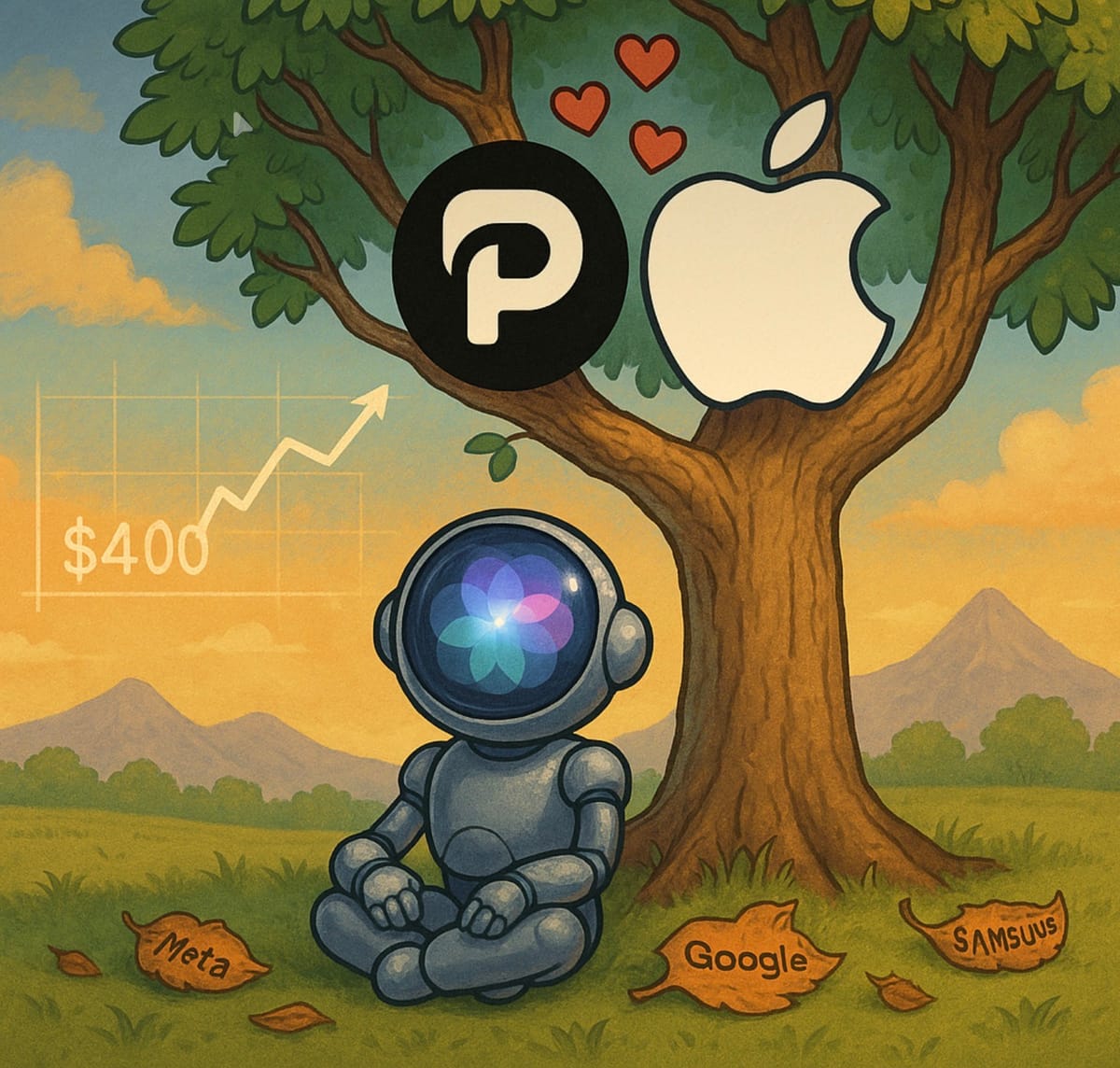
Build its own model and browser: This is the Apple Silicon playbook applied to AI. The problem? Time. LLM development is not just about model size—it’s about ecosystem, developer mindshare, and the invisible UX scaffolding users are already building with GPT-4, Claude, and Gemini.
Strategic Summary
The AI browser is not “just another browser.” It’s a UI and OS replacement in a very nascent form. Whoever owns it owns the user interface, the search funnel, the workspace, and the monetisation layer. That makes it a full-stack disruption of Apple’s UI-centric strategy.
- Safari cannot compete in its current form. Unless it becomes an AI-native experience, with LLM integration and memory, it will be abandoned by power users and eventually by developers.
- Apple is structurally constrained by its WebKit rigidity, its closed ecosystem, and its reluctance to let users take their context with them.
- Time is not on Apple’s side. The gravitational pull of agentic, memory-rich browsers grows with every passing month—and OpenAI’s upcoming browser will likely hit escape velocity the moment it ships.
Apple needs to stop thinking about AI as a feature, and start recognising it as the interface layer of the future. And that interface now sits inside a browser it doesn’t own, built on a platform it doesn’t support, run by a partner it can’t fully trust.
That’s not just an awkward alliance. That’s the start of disintermediation.
TL;DR By end of 2026, either Apple will be running an AI-native browser with open source access, or risk being run over by everyone – again - if it sticks within the walled garden of iOS-mandated WebKit which won’t play well with GPT or OpenAI’s browsers.
It’s that simple.
Some quick Q&A based on the comments and replies I’ve seen in discussions elsewhere:
1. “Safari Is No Longer the Default Gateway to Intelligence”
Tommo_UK notes the psychological shift now underway:
“What’s fascinating is the emotional break that’s happening. People are not just using Perplexity or ChatGPT for queries—they’re staying there. Safari, Chrome, even Google feel like legacy portals to an older mode of thinking.”
Why this matters: This is a valuable reframing—positioning LLM browsers not just as technical disruptors but as cognitive environments. Worth weaving into an understanding of this paradigm shift as a cultural/psychological bridge if you’re having trouble digesting this.
2. “The Platform Is Dead. The Interface Is the OS.”
In another comment thread, Tommo responds to a user lamenting that “Apple will never allow a GPT browser to take over the experience,” by asserting:
“They won’t need to. If the browser is the experience—and the app is self-contained—then Safari becomes the real threat to platform cohesion. Not Perplexity.”
Why this matters: It distills the thesis: the power of the LLM-browser lies not in replacing browsers, but in replacing why people use them.
3. “Perplexity’s Trojan Horse”
On the topic of Perplexity’s browser integration, Tommo makes this point:
“If your own lab space, memory, profile, and search behaviour are all natively available inside a Perplexity browser… then it’s not just better than Google. It’s better than the OS. It becomes the spine between all other apps.”
Why this matters: This is the heart of this article’s ‘Judgement Day’ warning: the threat isn’t disruption, it’s OS irrelevance. This comment deserves re-reading to absorb, fully.
4. User Resistance and “LLM Gaslighting”
In response to a critical user saying “but most people just want a simple effective search,” Tommo replies:
“Yes. And that’s why they’ll never return to search once they’ve experienced results that are multi-modal, non-redundant, and explanatory without ads. That’s not tech preference—it’s consumer relief.”
Why this matters: It undermines the “normies won’t care” rebuttal in the vein of the “voice of the people” counterargument in the “Resistance Is Futile” argument.
At the moment, Apple is seen as The Borg. The resentment against Apple will rise exponentially if they’re seen to be standing in the way or trust still undermining, user flexibility and choice.
5. Comment Thread Meta-Moment: AI Reading AI
In a thread about Perplexity’s transparency, someone jokingly asks: “But can it read your tone?”
Tommo’s response:
“If it’s any good, it’ll figure out I’m disappointed but hopeful. If it were Apple’s LLM though, it would probably parentally suggest I check my screen time.” 😁
Why this matters: Ok so this one’s one me, but it’s a satirical jab that captures the Apple AI tone-deafness meme, but with a serious message: Apple needs to be mindful not to over-sanitise its AI efforts, or just like every curated system, people will circumvent it in the end, like eWorld and AOL, to dive headlong into the messy world of the web, on their terms, without needing Rottweiler-like stewardship or a curated search return.
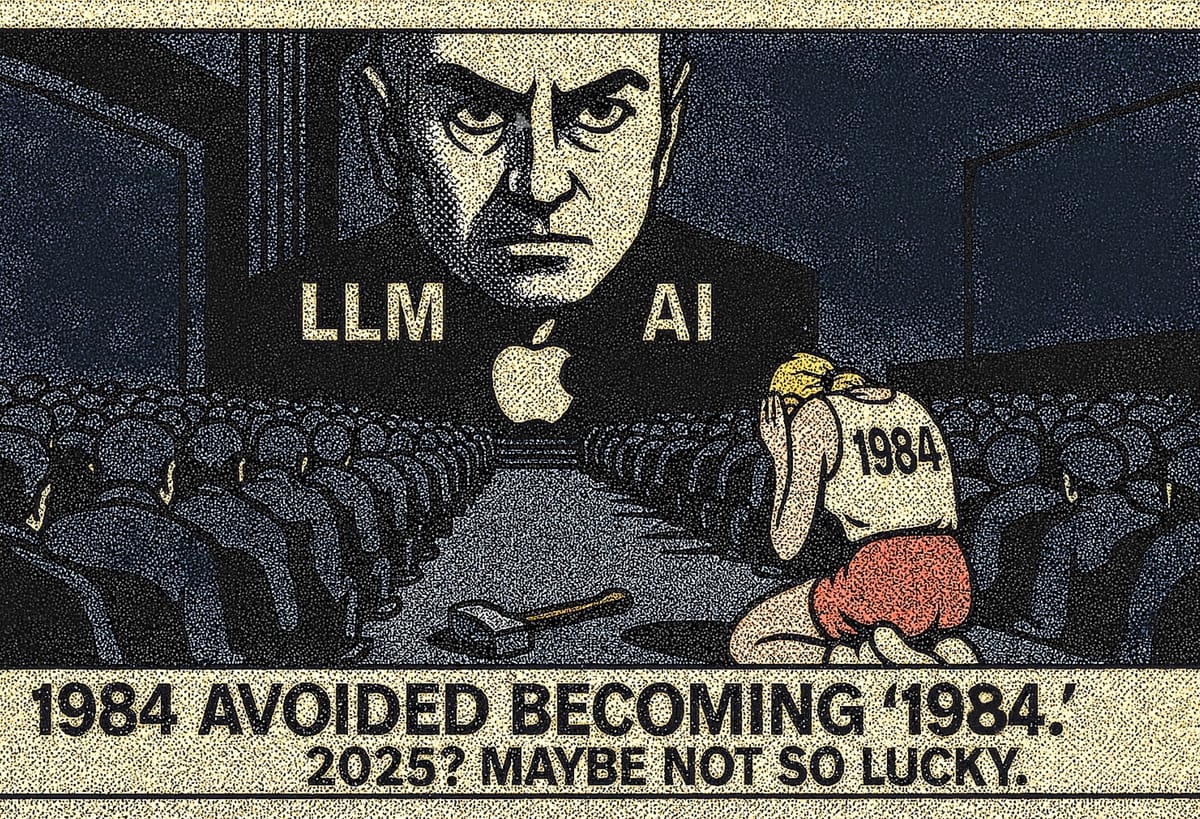
- Tommo_UK, London, 6pm UK GMT, 1pm US ET, 10th July 2025
- DM me on X @tommo_uk for more information.
Brought to you in real time, in full, no bias, total transparency. Breaking news, analysed in full, served up with a twist of lemon + a double shot of Espresso.
© 2025 tommo.fyi
Latest Article on Apple & Perplexity and how it could have let to AAPL hitting $400 by Q4 2027
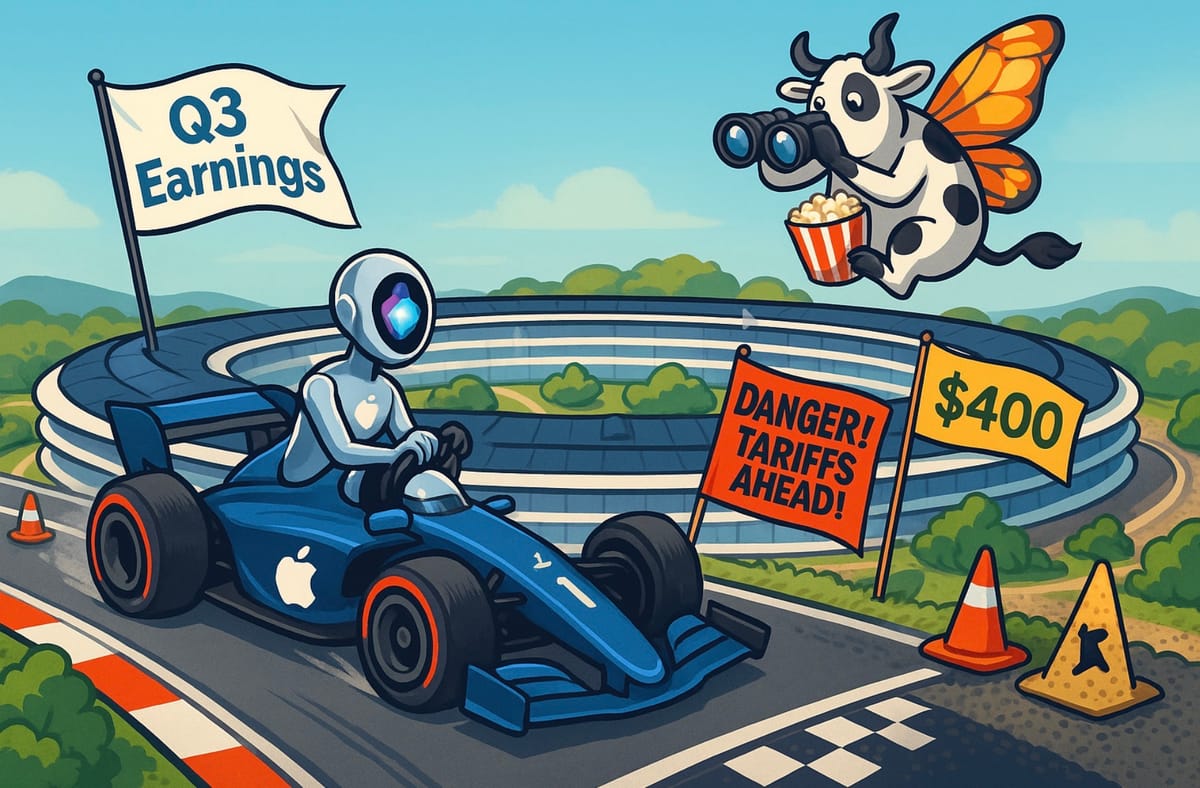
Please pass this to your friends, colleagues, investors, liquidators, families, or anyone you think might be interested in real time thought leadership commentary written in real time on the news, about the news, and looking into the future.
See those share buttons? Use them.
If this article helps you see what’s really at stake in the AI/browser wars—and how it could drive AAPL to $400 or slam it down to $160—then share it.
FB, LinkedIn, X, WhatsApp, email—whatever works. Let’s make sure nobody sleepwalks through this shi(f)t.
If you really want to get your teeth stuck into some meat from a few weeks ago and why Apple have maintained their hubris while forgetting how to ship anything except a Formula One Movie with an implausible plot, get a cup of coffee and have a long read here.
